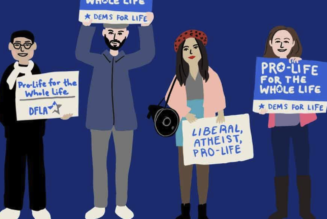
She once worked in full-time ministry jobs, but stopped going to Mass 2 years ago and most of her family and closest Catholic friends don’t even know she stopped. She reached out to tell me her story after reading a previous post on lonely Catholics. But, that isn’t the end of the story.
I want you to hear her story. She grew up in a very active Catholic family. She discerned a religious vocation for a while, she never had any big issues with Catholicism, and then after college she worked for 2 major Catholic apostolates and several parishes in full-time work. But, she never found deep Catholic relationships or community that cared enough to reach out to her. Maybe it was because she was single. Maybe it was something else. Whatever it was, she never felt like she mattered to others, at least not in a life-giving way.
So, when she hit the end of her rope and decided that being lonely and miserable (and not having anybody who cared enough to initiate a deeper relationship with her), she decided to stop going to Mass one weekend. One weekend led to more and more weekends, until she found herself not going at all. But, something else happened. She started to find others (outside the Church) who cared about her. In fact, she now finds herself happier than when she was “active” in her parish.
My question to you, Catholic reader, is – why should she return?
**I know what a lot of you are thinking – BUT the Eucharist, the Sacraments, the Magisterium!!! Yes, she is missing these things, but she isn’t miserable any longer and has to weight her happiness against the other things. The crosses she has are truly heavy and we need to be honest about that.
Still, your answer may be – she is supposed to “pick up her cross” and you are right, a disciple is supposed to do that. But, how many of us have complained or asked for our crosses to be taken away? I have. So, instead of thinking of all the reasons YOU are still Catholic, why don’t you think of all the reasons she isn’t…and what we might do about it.
In other words, are we willing to love others enough to do whatever it takes to help them grow closer to Jesus, to get them to heaven, and to be his instruments in a hurting world? Are we willing to suffer with them and for them? Are we willing to do more?
I tell this story to let you know that the Church (as it operates in 21st Century USA culture) is in drastic need of renewal and change in how we operate (not in what we believe). We certainly aren’t living up to the vision that Jesus has for his Church:
“I do not pray for these only, but also for those who believe in me through their word, that they may all be one; even as thou, Father, art in me, and I in thee, that they also may be in us, so that the world may believe that thou hast sent me.” -John 17: 20-21
This leads me to an even greater issue – what do we do once someone falls away from the Church, stops going, or no longer even identifies as a Catholic?
Below are some concrete suggestions that I hope you will consider.
1- Don’t answer questions they don’t have. Too often I hear Catholics monologue with those that they are trying to evangelize. It was once asked of an evangelist what they would do if they had 1 hour to evangelize an atheist and the answer was they would “listen for 50 minutes and respond appropriately for 10.” I agree and need to personally work on this. We need to know what others need in order to really help someone else. Nobody likes to hear someone preach at them, when they don’t first feel cared for. Most modern folks aren’t asking questions about purgatory or Mary. They are asking questions of identity, meaning, and God’s existence. They are asking large existential questions that many Catholics don’t have adequate answers for themselves.
2 – Be respectful enough to listen to the REAL reason they left, not the one you assign to them. Again – ask questions that get to the heart of the matter. “What made you leave?”, “What gives your life meaning now?”, “What do you miss about the Church?”, etc. Once you listen enough to understand, then you might have a better understanding of what you could do to help them. Furthermore – who doesn’t like to be listened to and truly valued, rather than turned into a project? One of my favorite maxims is – you can understand without agreeing. This ought to be practiced with our fallen-away friends and family.
3 – Aim to cure the sickness, not treat the symptoms. God is the Divine Physician, who wants to heal what ails us (i.e., sin and death). He does this by his grace, that we receive and choose to cooperate with. This grace is readily available to us (esp. In the Sacraments). So, the thing we want to do is get someone into a right relationship with God – not worry about treating the symptoms (their sin), before we deal with the relationship. In other words, relationships normally precede behavior change. Conversion precedes repentance. Responding to the Gospel precedes transformation of habits. Read more about this here and here. Notice, God is the physician who heals, not us. We can’t cure sin and death. But Jesus can…if only we let him.
4 – If they are hurt, then give them room to express their wounds. In the conversation with the woman above, one thing I made sure I did was to give her room to talk. Then I apologized on behalf of the Church, which should care that she has left our ranks. Furthermore, to let someone know that they are missed may just be the thing that gives them room to return. People want to be cared for. Once they know that you care, then you can earn the right to be heard by them.
5 – Invest in relationship before you invite back to the Sacraments. This might sound counterintuitive to many Catholics, but it works. Most fallen-away Catholics left the active reception of the Sacraments because something non-Sacramental was missing. So, we need to aim to replace that missing item. In most cases it is a relationship. The phrase to “meet them where they are at” is a good one, as long as you don’t intend to leave them where they are.
6 – Pray – I don’t think I need to go into depth with this one, but suffice it to say that if you don’t pray, then you have no access to Jesus’ spiritual power. Not only do you need to take care of yourself, but you can’t take care of other’s spiritual needs without God’s help. I have been praying every day for this woman, by name, for over 2 years now.
7 – When the time is right (and this will be different in each situation), give your testimony to the power of God in your life. If you don’t know how to give a compelling witness to conversion, then you can start by reading more about how to do it here.
8 – Never ever underestimate the power of proclaiming the Good News about Jesus. But, don’t stop with prolaiming it, but also invite a response. I have written about this is other places, so here is one link to help get you started, if you want to learn more.
Now a few things you DO NOT want to do:
1 – Grow impatient with God’s timetable. I frequently say that I love my own free will and can’t stand anyone else’s. This is because I get impatient with change and growth in others. I bet most readers can relate. Don’t let impatience get in the way of you working on doing your best to love others. Remember that God always wants the best for others more than you could imagine.
2 – Never nag, rant, or be too critical. Their reasons for walking away may seem like they don’t make much sense to you and that may be true. But, the reasons people walk away don’t need to make sense to you, for others to walk away. So, as much as you might be tempted to nag (esp. Family members), complain, argue, rant, or become critical – resist these temptation at all costs. They don’t help, but just drive others further away.
3- Don’t wait for them to come to you. You will need to close the distance here. All of us desire friends who take the initiative, invite us places, care for us, reach out, etc. Well, be that friend (or family member) to others and find out that being a good friend means you will eventually have good friends.
Some Final Thoughts
We Catholics must break out of this culture in order to capitalize on the potential that is now latent in our Church, in the U.S. In other words, we have to reinvigorate the Church with a hunger for Christ by the initial proclamation of the Gospel, intimate relationships with others, depth of our own interior life, and growth in personal virtue. Then we need to form others into intentional disciples by our evangelization. Furthermore, we then need to send them out to the world and repeat this cycle. The multiplication of disciples can and will change our culture and individual lives.
The age-old questions which ask how are we to turn the culture around are found in the age-old answers of getting into the hard work of evangelization and forming disciples who are equipped to take on the culture with vigor and determination.
Now is the time to proclaim the Good News!
Now is the time to form intentional disciples.
Now is the time for a renewal of our culture!
Now is the day of salvation.
Join Our Telegram Group : Salvation & Prosperity








